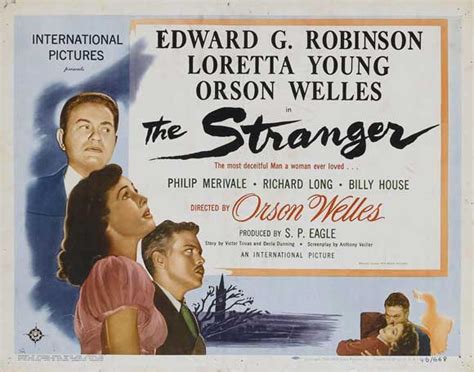
![]() Watch On Bruised Onion Studio YouTube Channel
Watch On Bruised Onion Studio YouTube Channel
The Stranger (1946)
American Film Noir Crime Drama.
An investigator from the War Crimes Commission travels to Connecticut to find an infamous Nazi.
This was the first mainstream American movie to feature footage of Nazi concentration camps following World War II.
Though not as well remembered as some of Orson Welles’ more original projects, this was the only film directed by Welles to show a profit in its original release.
A “Carthaginian peace,” as mentioned by the characters, is used to refer to any peace treaty demanding total subjugation of the defeated side.
It is based on the defeat of Carthage by Rome and the total destruction of Carthage thereafter.
In modern times, it is often used to describe a peace settlement in which the terms imposed by the victor are overly harsh and designed to keep the loser subjugated for a long time, if not forever.
The quote recited by Mr. Wilson (Edward G. Robinson) is from Ralph Waldo Emerson’s essay titled “Compensation“:
“The league between virtue and nature engages all things to assume a hostile front to vice. The beautiful laws and substances of the world persecute and whip the traitor.
He finds that things are arranged for truth and benefit, but there is no den in the wide world to hide a rogue. Commit a crime, and the earth is made of glass.
Commit a crime, and it seems as if a coat of snow fell on the ground, such as reveals in the woods the track of every partridge and fox and squirrel and mole.
You cannot recall the spoken word, you cannot wipe out the foot track, you cannot draw up the ladder, so as to leave no inlet or clew.
Some damning circumstance always transpires. The laws and substances of nature–water, snow, wind, gravitation–become penalties to the thief.”
| Directed by | Orson Welles |
|---|---|
| Screenplay by |
|
| Adaptation by |
|
| Story by | Victor Trivas |
| Produced by | Sam Spiegel |
| Starring |
|
| Cinematography | Russell Metty |
| Edited by | Ernest J. Nims |
| Music by | Bronisław Kaper |
|
Production
company |
International Pictures
|
| Distributed by | RKO Radio Pictures |
|
Release dates
|
|
|
Running time
|
95 minutes |
| Country | United States |
| Language | English |
| Budget | $1.034 million |
| Box office | $3.22 million 931,868 admissions (France) |
